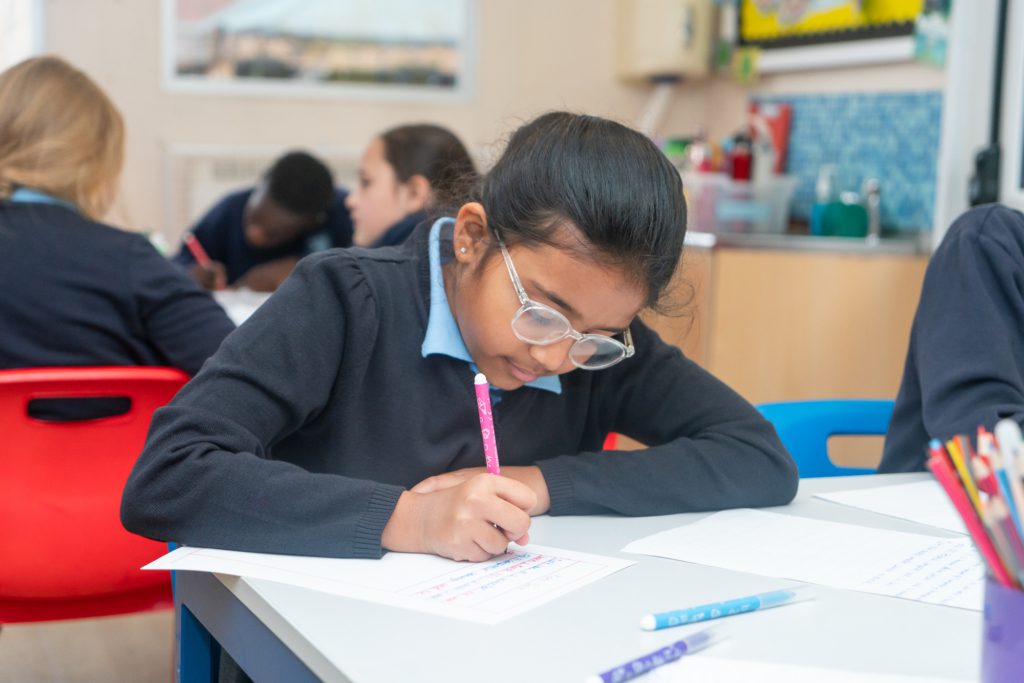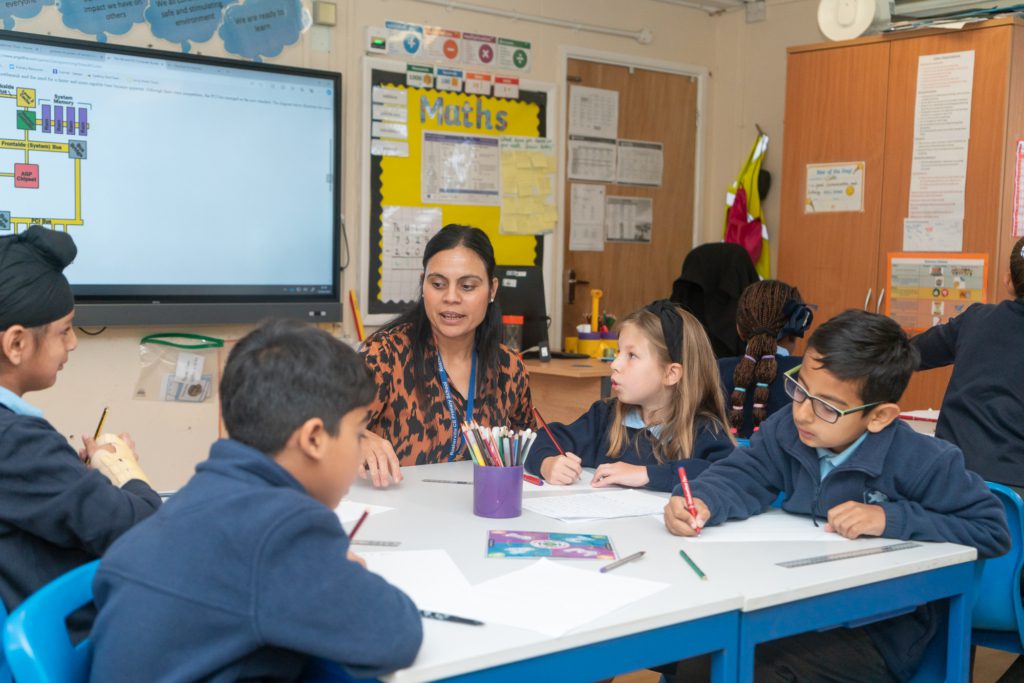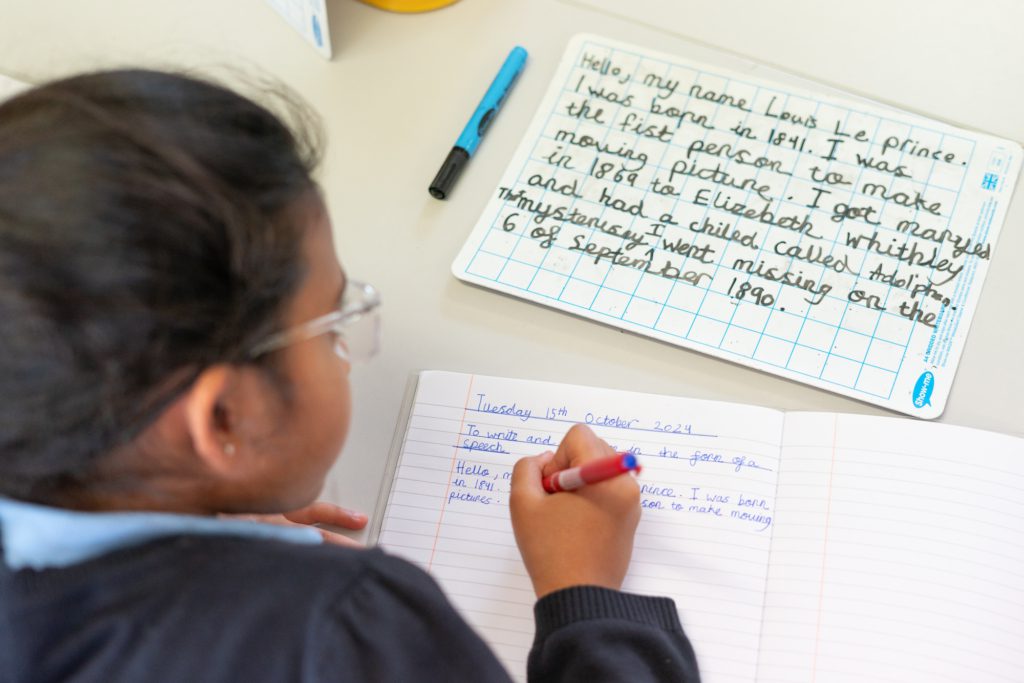English Writing Subject Leader: Miss C Foster
Here at Rosherville Primary Academy, we teach our children a writing curriculum that enables them to become confident, creative and independent writers.
Intent
It is our vision that every child will learn to write by being given real and exciting materials and opportunities. We will share excellent writing to inspire children to emulate styles. We encourage children to read their work for enjoyment, to read it aloud to others and provide audiences for writing. We want children to have an understanding that writing has a real purpose and that word choice and style can bring about change.
We firmly believe that good spelling is an essential skill that allows children to communicate their understanding in all curriculum subjects. In order for pupils to develop into effective and confident writers, they need to develop and use a range of effective spelling strategies. We particularly want the children to develop a love of language and the confidence to spell more challenging and ambitious words.


Implementation
At Rosherville we teach writing by following Pie Corbett’s ‘Talk for Writing’ approach. Our aim is to empower children as readers and writers, to inspire a lifelong love of reading and learning by choosing high-quality children’s literature.
At Rosherville, Talk for Writing begins in Reception and continues right through to Year 6. Children gradually build up a bank of stories and non-fiction text types so that over time they can tell (and write) imaginative and exciting stories and confidently instruct, argue, discuss, explain, inform and persuade. Children build up an internal bank of language that they can use to create their own versions of stories and texts.
Talk for Writing lessons at Rosherville are lively, multi-sensory and inclusive for all. Everyone joins in and can succeed. The first stage (imitation) is to learn stories and texts really well. We do this by mapping them out using pictures and symbols. We use drama, music and ICT to bring the stories and texts to life. They can then be developed through innovation (changing characters, altering the setting, adding in extra events or changing the ending). Through imitation and innovation, the children are then able to invent their own stories or versions.
As teachers we love Talk for Writing because we have seen the difference it can make to children’s learning – it gives them the confidence and ability to write knowledgeably for a range of different purposes.
By providing the children with a range of strategies we equip them with the independence to attempt spellings before asking for adult help.
Impact
High-quality modelling of the writing process leads the children to develop a critical appreciation of the way in which writing can be used to communicate in a variety of ways. Children use their writing skills across the curriculum and successfully adapt their writing to suit the purpose. Through collaborative approaches, children are able to edit and improve their work using key success criteria to support the process. A significant emphasis on developing vocabulary acquisition and understanding ensures that children use words with clarity, effect and precision.
In allowing pupils opportunities to develop a rich and exciting vocabulary, we are enabling them to become effective communicators.

English Writing in Each Stage
At Rosherville Primary Academy, Phonics is taught using the structure of our systematic synthetic programme ‘Little Wandle Letters & Sounds’. Children review and revise Grapheme-phoneme correspondence (GPC)s and words, daily, weekly and across terms and years, in order to move this knowledge into their long-term memory. Our phonics lessons help to support pupils with saying their sounds, writing their letters and understanding capital letters.
Click the link here to find out more about our Phonics curriculum
At KS1, pupils will be able to communicate their thoughts clearly about what they are going to write, and be able to draw pictures and note ideas, keywords and new vocabulary in a simple planning format. Through the integration of drama, pupils will be able to explore ideas using simple role-play and take on roles to fully understand the characters’ narratives. Written work will compose of past and present tense with the inclusion of capital letters, full stops, question marks and exclamation marks.
Click the links below to find out more information about KS1:
Please click the links below to view our year 1 and 2 writing expectations:
In KS2, pupils will be able to demonstrate the processes needed to plan writing. They will recognise, imitate and establish features of a selected form clearly through structural headings, paragraphs, introductions and conclusions, Through the integration of drama, pupils will be able to adapt a range of roles to develop creative and imaginative writing and respond appropriately to others when in a role.
Click the links below to find out more information about KS2:
- Year 3 and 4 Statutory Spelling List
- Year 5 and 6 Statutory Spelling List
- Year 3 and 4 Writing Genres
- Year 5 and 6 Writing Genres
Please click the links below to view our years 3-6 writing expectations:
English Writing Progression
Once our pupils have achieved the expected grammar and punctuation knowledge and skills, they focus on consolidation and deeper learning. To achieve this, we use the following approaches: Regular discrete lessons as part of normal classroom practice; challenging texts which extend vocabulary; higher reliance on self-evaluation and editing for improvement; continue to promote active, multi-sensory and investigative learning. All children from EYFS to Y6 follow a high-quality Literacy programme, which prepares, teaches and then consolidates both the concepts behind and the terminology of grammar and punctuation. Progress is measured and tracked as part of our assessment system.
Whole class teaching, with some extra intervention and support as required. Teacher modelling of sentence construction and punctuation editing and improving own writing editing and improving deliberate teacher errors, self and peer evaluation are embedded in school routine evaluation and discussion of the text, both fiction and non-fiction, draws out teaching points.
SEND Information
Interventions, support and challenges are constantly revised and adapted to ensure all children are supported in achieving learning. The above areas are robustly and continuously monitored to ensure any gaps in learning are addressed.
Home Learning
To support our spelling teaching we use Spelling Shed, where the children can practice their spellings on their devices at home through a range of fun and interactive games.

